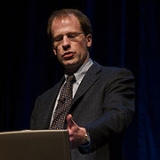
Nick Bostrom
Overview
Nick Bostrom (born Niklas Boström on 10 March 1973) is a Swedish
philosopher
at the University of Oxford
known for his work on existential risk
and the anthropic principle
. He holds a PhD
from the London School of Economics
(2000). He is currently the director of The Future of Humanity Institute
and a fellow of St Cross College at Oxford University.
In addition to his writing for academic and popular press, Bostrom makes frequent media appearances in which he talks about transhumanism
-related topics such as cloning
, artificial intelligence
, superintelligence
, mind uploading
, cryonics
, nanotechnology
, and the simulation argument
.
Bostrom is favourable towards "human enhancement", or "self-improvement and human perfectibility through the ethical application of science", as well as a critic of bio-conservative views.
In 1998, Bostrom co-founded (with David Pearce
) the World Transhumanist Association (which has since changed its name to Humanity+).
Sweden
Sweden , officially the Kingdom of Sweden , is a Nordic country on the Scandinavian Peninsula in Northern Europe. Sweden borders with Norway and Finland and is connected to Denmark by a bridge-tunnel across the Öresund....
philosopher
Philosophy
Philosophy is the study of general and fundamental problems, such as those connected with existence, knowledge, values, reason, mind, and language. Philosophy is distinguished from other ways of addressing such problems by its critical, generally systematic approach and its reliance on rational...
at the University of Oxford
University of Oxford
The University of Oxford is a university located in Oxford, United Kingdom. It is the second-oldest surviving university in the world and the oldest in the English-speaking world. Although its exact date of foundation is unclear, there is evidence of teaching as far back as 1096...
known for his work on existential risk
Existential risk
Existential risks are dangers that have the potential to destroy, or drastically restrict, human civilization. They are distinguished from other forms of risk both by their scope, affecting all of humanity, and severity; destroying or irreversibly crippling the target.Natural disasters, such as...
and the anthropic principle
Anthropic principle
In astrophysics and cosmology, the anthropic principle is the philosophical argument that observations of the physical Universe must be compatible with the conscious life that observes it. Some proponents of the argument reason that it explains why the Universe has the age and the fundamental...
. He holds a PhD
PHD
PHD may refer to:*Ph.D., a doctorate of philosophy*Ph.D. , a 1980s British group*PHD finger, a protein sequence*PHD Mountain Software, an outdoor clothing and equipment company*PhD Docbook renderer, an XML renderer...
from the London School of Economics
London School of Economics
The London School of Economics and Political Science is a public research university specialised in the social sciences located in London, United Kingdom, and a constituent college of the federal University of London...
(2000). He is currently the director of The Future of Humanity Institute
Future of Humanity Institute
The Future of Humanity Institute is part of the Faculty of Philosophy and the James Martin 21st Century School at University of Oxford, England...
and a fellow of St Cross College at Oxford University.
In addition to his writing for academic and popular press, Bostrom makes frequent media appearances in which he talks about transhumanism
Transhumanism
Transhumanism, often abbreviated as H+ or h+, is an international intellectual and cultural movement that affirms the possibility and desirability of fundamentally transforming the human condition by developing and making widely available technologies to eliminate aging and to greatly enhance human...
-related topics such as cloning
Cloning
Cloning in biology is the process of producing similar populations of genetically identical individuals that occurs in nature when organisms such as bacteria, insects or plants reproduce asexually. Cloning in biotechnology refers to processes used to create copies of DNA fragments , cells , or...
, artificial intelligence
Artificial intelligence
Artificial intelligence is the intelligence of machines and the branch of computer science that aims to create it. AI textbooks define the field as "the study and design of intelligent agents" where an intelligent agent is a system that perceives its environment and takes actions that maximize its...
, superintelligence
Superintelligence
A superintelligence, hyperintelligence or superhuman intelligence is a hypothetical entity which possesses intelligence surpassing that of any existing human being...
, mind uploading
Mind transfer
Whole brain emulation or mind uploading is the hypothetical process of transferring or copying a conscious mind from a brain to a non-biological substrate by scanning and mapping a biological brain in detail and copying its state into a computer system or another computational device...
, cryonics
Cryonics
Cryonics is the low-temperature preservation of humans and animals who can no longer be sustained by contemporary medicine, with the hope that healing and resuscitation may be possible in the future. Cryopreservation of people or large animals is not reversible with current technology...
, nanotechnology
Nanotechnology
Nanotechnology is the study of manipulating matter on an atomic and molecular scale. Generally, nanotechnology deals with developing materials, devices, or other structures possessing at least one dimension sized from 1 to 100 nanometres...
, and the simulation argument
Simulated reality
Simulated reality is the proposition that reality could be simulated—perhaps by computer simulation—to a degree indistinguishable from "true" reality. It could contain conscious minds which may or may not be fully aware that they are living inside a simulation....
.
Bostrom is favourable towards "human enhancement", or "self-improvement and human perfectibility through the ethical application of science", as well as a critic of bio-conservative views.
In 1998, Bostrom co-founded (with David Pearce
David Pearce (philosopher)
David Pearce is a British utilitarian thinker. He believes and promotes the idea that there exists a strong ethical imperative for humans to work towards the abolition of suffering in all sentient life. His book-length internet manifesto The Hedonistic Imperative details how he believes the...
) the World Transhumanist Association (which has since changed its name to Humanity+).

